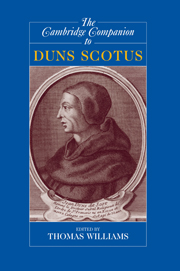Book contents
- Frontmatter
- Introduction
- 1 Scotus on Metaphysics
- 2 Space and Time
- 3 Universals and Individuation
- 4 Duns Scotus’s Modal Theory
- 5 Duns Scotus’s Philosophy of Language
- 6 Duns Scotus on Natural Theology
- 7 Duns Scotus on Natural and Supernatural Knowledge of God
- 8 Philosophy of Mind
- 9 Cognition
- 10 Scotus’s Theory of Natural Law
- 11 From Metaethics to Action Theory
- 12 Rethinking Moral Dispositions
- Bibliography
- Citations of works attributed to John Duns Scotus
- Index
1 - Scotus on Metaphysics
Published online by Cambridge University Press: 28 May 2006
- Frontmatter
- Introduction
- 1 Scotus on Metaphysics
- 2 Space and Time
- 3 Universals and Individuation
- 4 Duns Scotus’s Modal Theory
- 5 Duns Scotus’s Philosophy of Language
- 6 Duns Scotus on Natural Theology
- 7 Duns Scotus on Natural and Supernatural Knowledge of God
- 8 Philosophy of Mind
- 9 Cognition
- 10 Scotus’s Theory of Natural Law
- 11 From Metaethics to Action Theory
- 12 Rethinking Moral Dispositions
- Bibliography
- Citations of works attributed to John Duns Scotus
- Index
Summary
This chapter discusses Scotus’s metaphysics under six headings: the nature of metaphysics itself as a discipline (Section I); identity and distinctness (Section II); the extent and scope of the Aristotelian categories (Section III); causality and essential orders (Section IV); matter, form, and the composite of matter and form (Section V); and a brief return to the nature of metaphysics (Section VI). Some metaphysical topics are not treated here but in other chapters of this volume: space and time (Chapter 2), universals and individuation (Chapter 3), and modality (Chapter 4). Scotus’s proof of God’s existence, discussed in Section IV, is examined in Chapter 6.
METAPHYSICS AS THE SCIENCE OF BEING
Theoretical Science
Scotus holds that there are exactly three real theoretical sciences, pursued for their own sake, that are open to us in our present life: metaphysics, mathematics, and physics (In Metaph. 6, q. 1, nn. 43–6). Each qualification is important. The requirement that such sciences be “real” – that is, concerned with things in the world rather than our concepts of them – excludes logic, which is the normative science of how we are to think about things, and thus concerned with concepts. The requirement that such sciences be pursued for their own sake excludes ethics, whose primary goal is to direct and regulate the will. The requirement that we can attain such knowledge in the condition of our present life, where we can only know things through sense perception and hence have no direct epistemic access to principles or to immaterial beings, rules out theology in the strict sense as well as a properly axiomatic metaphysics; we can however construct a ‘natural’ theology and metaphysics within our limitations. Mathematics and physics are defined in terms of material substance. Mathematics deals with material substances in their material aspect, namely, in terms of their purely quantitative features (which they have in virtue of their matter) and whatever is consequent upon those features.
- Type
- Chapter
- Information
- The Cambridge Companion to Duns Scotus , pp. 15 - 68Publisher: Cambridge University PressPrint publication year: 2002
- 12
- Cited by

